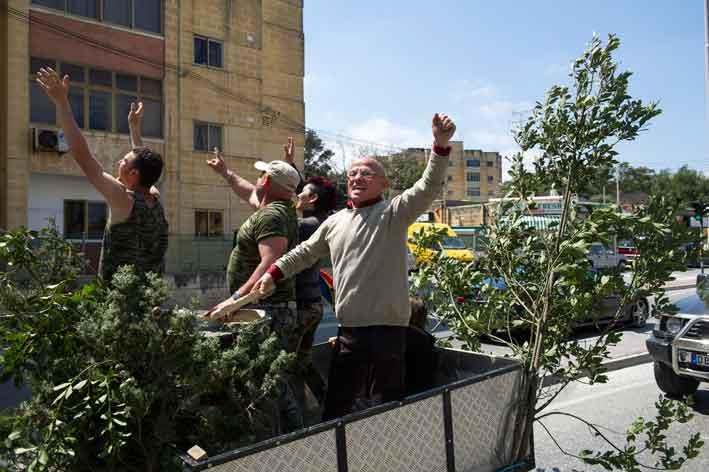Prime Minister Joseph Muscat may well claim a fair degree credit for hunters’ victory in last Saturday’s spring hunting referendum, but backing the winning horse in this referendum may prove to be something of a poisoned chalice just yet.
Dr Muscat’s tone in a post-referendum press conference yesterday – in which he emphasised that this was hunters’ last chance to change their ways and ensure they do not tolerate any wrongdoing – suggests that he is aware of the risk that the upcoming spring hunting season may prove to be an embarrassment.
A number of factors may have been crucial in ensuring that the “yes” vote won, not least the fact that the vote was held before the opening of a spring hunting season, thus ensuring that people did not have fresh memories of illegal hunting and incidents of aggression when they cast their vote.
But any illegalities or incidents of aggression in the upcoming hunting season – even if they prove to be far less frequent than in past seasons – could help make the winning side, and the Prime Minister, appear to be on the wrong side of history.
Dr Muscat may end up forced to stop the hunting season – as he threatened to do yesterday should blatant abuses take place – and attract hunters’ wrath once more. The Prime Minister had been at the receiving end of insults by hunters not too long ago, when he suspended last autumn’s hunting season due to illegalities and an impromptu protest march took place in Valletta.
And the persistence of hunting illegalities may end up paving the way for a second referendum on the subject, although the Referenda Act sets out that electors will have to wait for at least two years before demanding an abrogative referendum on the same subject.

Stacking the odds
It may be true that both Prime Minister Joseph Muscat and Opposition Leader Simon Busuttil declared that they were voting in favour of spring hunting, but only the former could reasonably see the result as a form of victory.
Dr Busuttil’s stand was at odds with that of most of his party’s supporters, if past surveys on the subject are any indication, as well as the referendum result, which shows that the “yes” camp largely performed well in Labour-leaning electoral districts.
Both party leaders said that they would leave it up to the public to decide on the issue, but Dr Muscat did stress his support for spring hunting on a number of occasions, while Dr Busuttil refrained from commenting after his initial declaration.
But the government may also have helped sway the result through the way the referendum was organised, particularly through two key decisions.
One of these decisions was ensuring that a “yes” vote would be in favour of hunting, rather than the opposite, even though the Coalition Against Spring Hunting which made the referendum possible was initially campaigning on a yes vote.
Campaigning for a yes vote allowed hunters to engage on a more “positive” campaign than might have been possible; a negative campaign might have been more difficult to sell. Incidentally, the “yes” vote has won in every referendum held in Malta to date.
More crucial, however, was the decision to hold the referendum before the opening of a spring hunting season. The decision may have pleased anti-spring hunting campaigners, as it may have spared the country an additional hunting season, but also robbed them of a possible propaganda coup.

Hunters, conversely, appeared to be hoping that a spring hunting season would precede the referendum, as evidenced by their attempt to buy time through court action, but may now have reasons to be grateful that they failed in their attempt.
A number of incidents which took place in the 2014 spring hunting season highlights how the anti-spring hunting campaigners might have been helped if the referendum took place after a hunting season.
When respected British conservationist and TV personality Bill Oddie came to Malta, he was derided as a “mental case” by the FKNK, who highlighted his publicised struggles with depression – even though the same federation had previously cited depression suffered by its members as an argument in favour of continued hunting and trapping.
The subsequent arrival of another British naturalist – Chris Packham – also proved to be an embarrassment for hunters, particularly after he, and a number of BirdLife activists who accompanied him, ended up questioned by the police at the request of hunters for spurious claims of invasion of privacy.
As mentioned above, last autumn’s hunting season was also suspended in the face of abuse. But the yes camp stood to gain as memories of these incidents faded from public consciousness.

IVA campaign edges out
But it may also be argued that hunters’ campaign was better organised – and more effective – than the Spring Hunting Out (SHout) campaign.
The IVA campaign was cynical at its core, not least in the fact that hunters took a back seat in favour of the FKNK’s lawyer Kathleen Grima, whose appearance contrasts sharply with people’s general impressions of what hunters look like. In fact, the sort of hunters that characterised last September’s protest were conspicuously absent, in favour of a gender-balanced assortment of young people reminiscent of political parties’ own electoral campaigns.
And one of its main arguments – that other “hobbies” could be threatened by referenda if spring hunting was banned by referendum – was a fallacy, while discussion on hunting itself was kept to a minimum. But it is clear that its messages managed to resonate among many.
SHout, on the other hand, may have been more earnest in its campaign, but its efforts may have lacked the necessary focus.
Among other things, the SHout campaign appears to have been wary of appearing as aggressive, perhaps in the belief that such campaigning would generate antipathy towards it.
But this may have backfired: after all, Iva’s cynical campaign was hardly ever going to resonate with those opposed to hunting, but it clearly reached out to the voters it needed.

What the vote may mean
The referendum was the first to be organised through a public initiative, but the fact that it failed to achieve its aims – particularly in the face of opposition by the leaders of the two largest political parties – may create the impression that it is useless to challenge the status quo in such a manner.
More to the point, it may weaken a pro-environment “lobby” which already faces many challenges, not least planned and proposed development projects which would take up more undeveloped land, including the planned “luxury” development in – and around – the White Rocks site and the proposed development of a number of hotels in the undeveloped stretch of land between Marsascala and Xgħajra.
Incidentally, such developments would also present a threat to hunters, as they would only serve to encroach on areas that they use to practice their pastime, although hunters – in spite of their apparent political strength – have been conspicuously silent on the issue of over-development over the years.
On the other hand, environmentalists may take comfort in the fact that the referendum was only lost by a slim margin in spite of the fact that the “yes” camp was endorsed by the main political leaders.
Whether this would strengthen their hand in the long term remains to be seen however; that they would be weakened in the short term seems more of a certainty.